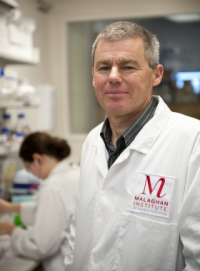
Top scientists call for urgent COVID vaccine strategy to ensure New Zealand’s health and economic viability
Some of New Zealand’s top scientists are urging the need for a national COVID-19 vaccine programme to ensure New Zealand is best placed to access an effective vaccine at the earliest opportunity.
Malaghan Institute Director Professor Graham Le Gros and the University of Otago's Professor Miguel Quiñones-Mateu and Associate Professor James Ussher say that New Zealand cannot afford to wait for a COVID-19 vaccine to be developed offshore.
“While there are multiple vaccines being developed overseas, we are concerned about the ability of manufacturers to scale up vaccine production to meet unprecedented global demand, and those countries will almost certainly require vaccine manufacturers to meet their own requirements before allowing export to other countries,” says Professor Le Gros.
They are urging the Government to consider building New Zealand-specific capability which can contribute to the worldwide vaccine development effort, secure early access to a SARS-CoV-2 vaccine for New Zealand and Pacific nations, and build capability to respond to future pandemics.
“Currently, the vast majority of New Zealand’s population is immunologically naive and remains susceptible to COVID-19 for the foreseeable future,” says Professor Le Gros.
“A vaccine is the only clear exit strategy that will allow New Zealand to return to normality.”
Professor Quiñones-Mateu says the group believes that waiting out the pandemic and relying on sourcing a safe and effective vaccine from the global market in the future is fundamentally the wrong approach.
“There is a very high likelihood that New Zealand will be well down the pecking order when it comes to getting timely access to sufficient quantities of an internationally developed vaccine."
While it could be reasoned that it is better for New Zealand to source a vaccine globally given the high cost of vaccine development, clinical trials, and manufacturing, Associate Professor Ussher says the challenge with this strategy is that we do not know when that future will be, what a safe and effective vaccine against COVID-19 should look like, and whether countries will hoard vaccines behind a single supplier, and close key pharmaceutical exports.
“We cannot afford to sit back and hope for a best-case scenario – action is needed now to ensure New Zealand can access a vaccine at the earliest possible opportunity.”
The scientists are seeking for New Zealand to:
1. Initiate a programme to evaluate the best vaccines being developed internationally with scalable potential in New Zealand, to be accessible to the entire population.
2. In parallel, progress COVID-19 vaccine development programmes nationally with leading research institutions, government, and industry.
3. Build capability for vaccine production sufficient to rapidly vaccinate everyone in New Zealand when a vaccine becomes approved either nationally or internationally for public use.
4. Develop a plan for how a vaccine will be rolled out and who should receive it first.
Professor Le Gros, Professor Quiñones-Mateu and Associate Professor Ussher are progressing discussions with government, academics and industry to define a cohesive rapid response plan to ensure New Zealand is not left waiting to access vaccines from other countries and is well placed to respond to future virus outbreaks.
ENDS
Background
Professor Graham Le Gros is a leading immunologist, Director of the Malaghan Institute of Medical Research and Leader of its Allergic and Parasitic Diseases Programme. He is a Fellow of the Royal Society of New Zealand and an Honorary Fellow of the Royal College of Pathologists of Australasia. In 2014 was made a Companion of the New Zealand Order of Merit for his services to medical research.
Professor Miguel Quiñones-Mateu has over 25 years of successful scientific career in four different countries. He has broad scientific experience, both in the academia and in the industry, becoming an accomplished investigator with particular success in translational research. During his long scientific career in virology he has been answering both basic and clinical questions related to drug resistance, novel antiviral strategies, and the development of innovative methodologies. He recently moved to New Zealand to join the Department of Microbiology & Immunology at University of Otago as the new Webster Family Chair in Viral Pathogenesis.
Associate Professor James Ussher is a clinical microbiologist and an immunology researcher in the Department of Microbiology and Immunology, University of Otago. His research interest is in immunity to infection and in antimicrobial resistance. He is the Director of the Webster Centre for Infectious Diseases.



